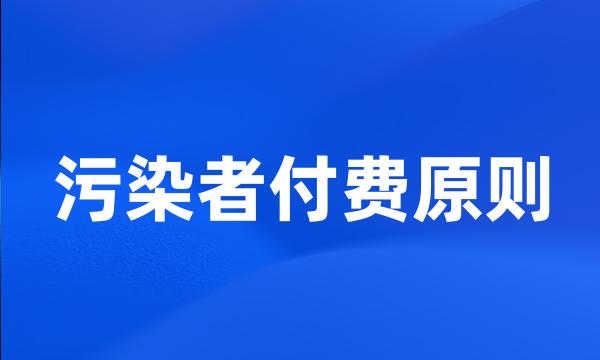污染者付费原则
- polluter-pays principle
 污染者付费原则
污染者付费原则-
污染者付费原则及其扩展是体现规制中激励理论的环境政策制定原则。
Polluter pays principle and its extensions are the basic principles reflecting the making of environmental policies in the incentive theory .
-
第一,根据污染者付费原则,对高碳产品征收碳税符合环境治理要求。
First , according to the Polluter Pays Priciple , imposing carbon tax on high-carbon products is consistent with environment protection requirement .
-
排污收费制度是污染者付费原则的具体实践和运用。关于排污收费的性质,有多种学说,而以经济补偿说最为科学合理。
As to its essence , there are several kinds of theories , in which doctrine of economic compensation seems most scientific and reasonable .
-
这些理论为早期的环境经济学研究提供了理论分析的基础,即污染者付费原则的确定。
These theories laid a foundation for the earlier environmental economists to conduct theoretical analysis , that is , to bring forward the polluters pay principle .
-
环境经济学认为环境问题是由外部性引起的,因此建立起了一套克服外部性的污染者付费原则体系作为环境经济政策的基本原则。
The externality theory is the base of environmental economics , it establish the " Polluters Pay Principle " system as the basic principle of the environmental economic policies .
-
生产者责任延伸理念被广泛应用到废弃物的管理中,它秉承了清洁生产宗旨,遵循污染者付费原则,将生产者的责任延伸到产品的整个生命周期流程,特别是产品消费后的废弃阶段。
The thought of EPR is applied to waste management widely , it receives the cleaner production tenet , follow the " polluter pay " principle , extend producer responsibility in the whole life cycle flow , especially the abandoned stage .
-
在责任主体一章分析了污染者付费原则中的平等机会权和不歧视原则,并分别就经营者和国家的赔偿责任作了法律文本和实践情况的对照和总结。
In the Chapter of party that is liable , it elaborates the right of equal access and non ‐ discrimination rule , and compares and concludes liabilities of the operator and the state with reference to legal texts and state practice .
-
二十世纪70~80年代,发达国家逐渐意识到命令.控制手段的有限性,开始尝试使用经济手段应对环境问题,其中以污染者付费原则为基础的环境费就是一种重要的经济手段。
During 1970 ~ 1980s , the developed countries realized the limit of command-control instruments and began to use economic instruments to deal with environmental problems . The environmental fee is one of the important economic instruments based on the " polluter pays principle " .
-
各国应根据其温室气体排放、依据“污染者付费”的原则得到摊派。
Countries should be assessed according to their greenhouse gas emissions , on the " polluter pays " principle .
-
污染产品税也是一种基于刺激的环境税,也是以污染者付费为征收原则。
Pollution-product tax is also a kind of product tax based on stimulating environment tax ; impose tax on product which may bring pollution .
-
直接污染税是基于刺激的环境税种,将污染物的排放量作为计税依据,只有污染者是征收对象,因此符合污染者付费的征收原则。
Direct pollution tax is based on stimulating environment taxes conforming to the polluter-pays principle , only the polluters are levied .
